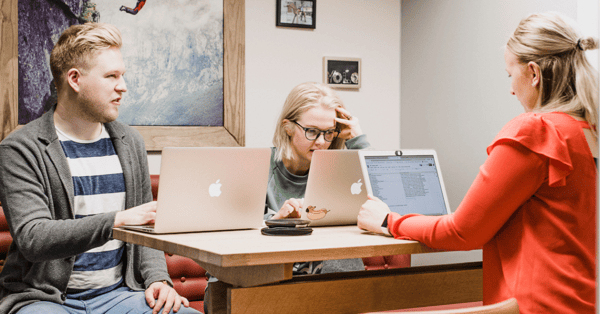Since Lyyti was founded, it has been a company with a strong and distinctive corporate culture. In the early years, the culture was largely built around a community working closely together in the same office, where help, joy and friendship flourished.
As the years passed and the business expanded beyond the borders of Finland, we realised the need to concretise our valuable culture so that we could manage it now and in the future more systematically. We didn't want to leave the development of our culture to chance, because, for us, corporate culture is an important tool for growing the business. As a result, we wrote The Green Book of Lyyti at the beginning of 2022.
The Green Book of Lyyti has recorded many cornerstones of our culture, from our history and values to the vision of the future. However, one of the most important, if not the most important, chapter in The Green Book is the very first one: Lyyti's view of human nature.
When given the benefit of the doubt
We wanted to start the book with a description of our view of human nature, perhaps a little unusually, because we felt it so strongly refers to everything we do. At the end of the Green Book we have listed a few books that have contributed to the shaping of our culture, and one of them is Rutger Bregman's Human kind - A Hopeful History.
Among other things, Yuval Noah Harari, who wrote A Brief History of Humankind, has said that "Bregman's Human kind challenged my thoughts and made me look at humanity from a completely new perspective".
In a way, this book did the same for us, or at least for some of us. For some, the Human kind validates our own beliefs that people are naturally good and decent and not evil and untrustworthy.
At Lyyti, all employees are allowed to buy interesting books, and the Turku head office also has a physical library. We strive to read interesting literature, reflect on the things learned from them in the light of our business, and implement the things learned from them in a way that suits us.
This is probably also the most important lesson about the importance of reading, at least for me: everyone can read, but only those who can read, adapt what they have learned to their own environment and apply the lessons successfully, get the real benefit.
Human kind was read by several people from Lyyti, and its main message about the natural functioning of people when no one is watching or controlling led to the first point of our View of human nature: people are, in general, trustworthy.
From theory to practice
What does this mean in practice? As a single sentence on a page of a culture guide, it is easily just a jingle of words and doesn’t come across as being very meaningful. For us, it means that we try to plan all operating models through trust instead of control.
For example, remote work, travel bills and decision-making. The remote work instructions for us are freely translated into "use common sense", the instructions for using the company's money are "use the company's money as if it were your own", all credit card and travel invoices are openly visible to everyone without any separate approval procedures, and the decision-making model is the same for everyone, from the summer intern to the CEO.
Without a clear and mutually agreed understanding of human nature, all these operating models could be very different. We have no need for control based on hierarchy and it is easy to justify this. I am not saying that our operating models are a great fit for all companies, but based on our understanding of human nature, I am sure that they are exactly right for Lyyti.
Similar articles

Discussing growth - are you learning on the job and staying relevant?

Lyyti is best friends with many, including Human Resources

Will better internal meetings be your future superpower? (w/ template)

Share your most embarrassing moment with your team and thank us later




